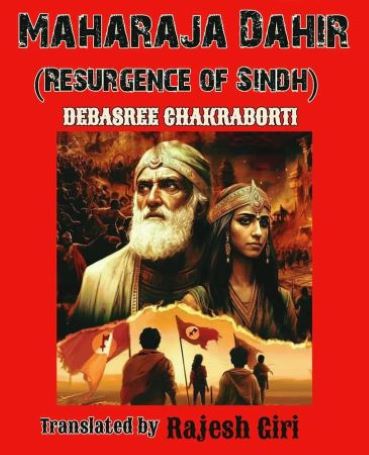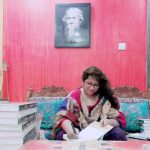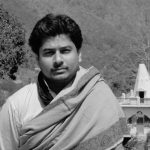
The English translation of a novel ‘Maharaja Dahir’ authored by Kolkata-based renowned novelist Debasree Chakraborti in Bengali language. The novel has been translated by Rajesh Giri
Nerun Kot /Narayan Kot
Year 712 AD
The sun has set a while ago. At this time a strange tranquility prevailed in Nerun. Over the huge wall that surrounds this city, the flag is flattering in the wind and announcing the independent existence of Sindhu Desh. At dusk, prayers have begun in the huge temple of Buddha in the heart of the city. The Buddhist citizens light up the courtyards of their houses and their temple grounds and start chanting the Panchasila mantra with utmost concentration:
‘Samsar-vatta dukha toh munchitva nib-ba-nang satchikaranthya-oks ahang bhante tisranena sa panchasilang dhammang yachami, anugagahang katva st deth me bhante.
Dutimpi, samsaravatta dukha toh munchitva nibbanang satchikaranthya-oks ahang bhante tisranen sa panchasilang dhammang yachami, anugagahang kattwa st deth me bhante.
Tatiyampi samsaravatta dukha toh munchitva nibbanaang satchikaranthya- oks ahang bhante tisaranen sa panchasilang dhammang yachami, anugagahang kattva st deth me bhante.
That is, O God, we will refrain from violence, refrain from stealing, never take illicit path in life, never tell lies and refrain from taking intoxicating drugs.
May they unite with Lord Buddha at this time!
In the path shown by God, they dream of creating an environment of peace on this earth. Now every evening the people of Nerun are praying for the peace of the souls of the people of Debal. If many people pray united, then prayer becomes more powerful which may transcend to God.
‘I want the next attack to be more terrible than the massacre you have carried out on the country of Sindh so far. If the Indus River and the sea turn red with the blood of the infidels, only then our revenge will be successful’ Hajjaj instructed Bin Qasim
While the people of Nerun were engrossed in the worship of God, at that time Muhammad bin Qasim arrived outside this city with his huge army. From a distance they do observe the city. The city is like a yogi in meditation; in the nature around the city a certain kind of peace also pervades. Several thousand troops of Muhammad bin Qasim start surrounding the entire city gradually along the edge of the city walls. Then large stone throwing catapults were placed at some distance from the city walls. This is the time for Isha prayer. The Arab soldiers started praying the Isha prayer. Through this prayer they seek strength from Allah. When the prayer was over, Muhammad bin Qasim closed his eyes and raised both hands to pray. He continued to pray to Allah for victory over Nerun. At that time, Abu Mughariya brought the messenger of Hajjaj with him. The messenger left handing over Hajjaj’s letter to Muhammad bin Qasim. Every day during the Islamic conquest of Sindh, Hajjaj used to send messages to Muhammad bin Qasim to strengthen his morale and that of the soldiers, so that his emissary’s forces would not be defeated for the slightest mistake. A soldier held up the light of a torch and Muhammad bin Qasim began to read the letter. Hajjaj wrote, ‘Qasim, I am proud of you and the rest of the crusaders. You have inflicted a terrible punishment on the disbelievers who imprisoned and tortured the children of Allah. From the vast region of Sindh the cries of the infidels are heard as far as Makran, which is reaching Allah through the holy sounds of Azan.’
‘I want the next attack to be more terrible than the massacre you have carried out on the country of Sindh so far. If the Indus River and the sea turn red with the blood of the infidels, only then our revenge will be successful. And always remember one thing, the soldiers should always be satisfied. You will give them considerable liberty, and divide the bulk of the ghanimat (Plundered wealth) among them. A bulk share of looted resources will multiply their thirst for attack. And now it is your job to keep raising this thirst. At the end I will say the same thing – always be grateful to Allah and pray daily. This war is for the protection of Allah.’
After reading the letter Mohammad Bin Qasim rose up and shouted ‘Allah Hu Akbar’. Along with him, thousands of Arab soldiers gradually rose up with this cacophony, which beats like a terrible battle drum that echoed on the walls of Nerun city.
Guards of Nerun became very frightened and terrified on hearing that sound. A few days ago the merchants who came from Persia narrated the terrible fate of the city of Debal and its people to the citizens of Nerun. Hearing the description of the carnivorous animals devouring among the body parts of hundreds and hundreds of piled up dead bodies shook the souls of the people of Nerun. They became non-violent long ago by following the path shown by Lord Buddha. So they could not tolerate these violent incidents at all.

The war cry ‘Allah Hu Akbar’ crossed the city walls and entered the city. Hearing this unfamiliar uncanny sound, the dwellers became intimidated. They realized that attack had begun on them; in these few days the people of and around Nerun had become very familiar with the sound of Allah Hu Akbar. People understood that after Debal they are attacked this time.
The chief monk of the Buddhist temple, Pragyananda, Bhikkhu Ramu told the people that if the enemy strikes you, you will never strike back
The town-people came out of their houses and of Buddhist gompa and came down to the streets. Thousands and thousands of the people of Nerun are agonizing in panic, as they are non-violent; they do not know how to respond to violence. At that time, two illuminated points started coming from a distance.
Anand and Rahul, the chief guards of the city, came into the city with torches and requested the citizens to take shelter in the Nerun Fort. First, the old men, women and children of the city were taken inside the fort. Unlike Debal the people of Nerun were not warriors; they always stayed away from violence and bloodshed. The chief Buddhist monk of this city, Prajnananda Bhikkhu Ramu always told the citizens that there is need to practice ‘Brahma Vihara’ in our lives to make our personal life, family life, social life and even our surroundings to be peaceful. This brahmavihara is to acquire mental faculties like friendship, compassion, humility and abstention. Basically the idea of ’Brahma Vihara’ is to be kind to all people and all living beings, to love all, to be tolerant and to think about the welfare of all. ‘Brhamvihara’ is the act of making the infinite mind think of the universe in a loving, friendly way. That love is not a little love, it is as vast as a mother loves her only son’. So where is the possibility of anyone being harmed, oppressed by us? Religion is something from which to get benefit, one should not become religious only by speaking, reading or listening. If religion cannot be applied consciously in one’s life, then religion cannot have any effect on us. Rather than the practical aspect of religion, the aspect of ritual should not become the primary details in our life. Let this inspiration that conquers the greed, hatred, infatuation, anger, thirst, decay and conquerors that dwell within us and strike our hearts. That will bring peace that will bring relief. And freedom from suffering further resulted to self-liberation. Tathagata Buddha himself wanted this.
They sat inside the fort and tried to calm their minds. Among them in this fort was the chief monk of the Buddhist temple, Pragyananda, Bhikkhu Ramu. He told the people that if the enemy strikes you, you will never strike back, as often as they strike, you will remain calm. Will see slowly their minds would change. Then their hearts will be awakened, they will think that as many times as we have hurt one side, they have silently endured and In return they offer only peace and love. When this feeling is awakened in human mind, the Buddha will be awakened within him. If we can carry forward this work of Lord Buddha, if we can bring the misguided to the path of truth and peace, peace will be established all over the world.
That day, when Prajnananda bhikkshu Ramu was preaching peace to the city dwellers inside the Nerun fort, Mohammad bin Qasim’s soldiers started throwing huge stones on the city wall with their special equipment. After several blows, the walls of Nerun city collapsed from all sides. When the wall of Nerun city was collapsing with terrible sound, Prajnananda bikkshu Ramu said to the city dwellers, “You are fortunate, therefore Lord Buddha has given you this great opportunity, not everyone gets such opportunity. I don’t want any bloodshed in this city, the enemy has entered the city and we will surrender to them. I have heard that the women of Debal have surrendered to Agnidev; they have made a mistake. It is a great sin that they have suffered their own souls by adopting this terrible way of death. Before they break down the gates of the fort, open the gate by yourself and surrender. Surrendering unarmed will awaken their inner self. Be mentally prepared to endure all kinds of torture from the enemy side. He closed his eyes and folded his hands and said:
‘Namami Buddhang, Guna Sagarantang;
Satta sada hontu, sukhi awber|
Kayo Jiguchcho, asuchi dug-gondho;
Gachchanti sabbe maranang ahang Cha’
Along with him, others chanted this mantra in unison. When the city walls were breached, thousands of Arab troops entered the city like a deluge. The city guards, including Anand and Rahul, were almost shocked, as their inner Kshatriya dimension turned into a dimension of peace after listening to the message of non-violence for so long. They surrendered facing the death in front. Anand and Rahul were taken to Mohammed Bin Qasim. Anand folded his hands and said, “We were scared by your sudden attack; that’s why we didn’t open the gates of the city. We apologize for this, please forgive the people of Nerun.”
Mohammad bin Qasim was very pleased with the gesture of Nerun’s chief gatekeeper and said, “I am very pleased with your behavior, but where are the townspeople?”
Anand said, “The people of Nerun are non-violent and very peaceful. After hearing an unknown noise during the evening prayer, they got very scared and took shelter in the city fort. They will come out of the fort if you give them permission.”
Muhammad Bin Qasim was very surprised at this strange behavior of the people of Nerun. He said, “Allah, the Exalted, is pleased with your behavior. You have accepted the Messengers of Allah with great respect without any resistance, so we will not harm you.”
Neither Anand nor Rahul had to send a representative. After opening the gate of the fort, the people of the city came out of the fort with folded hands, keeping the chief monk in front of them. Around the city, armed Arab soldiers dressed in black were standing; their faces were covered with black cloth, unable to read their faces.
Chief Bhikkhu Prajnananda Bhikkhu Ramu has a strange gentleness in his body language. He left the temple in the evening holding a lotus flower from Lord Buddha’s feet. He took that lotus between his two hands and stood in front of Muhammad bin Qasim. He bowed and held out the lotus towards him with a smiling face and said, “Om Shanti.”
Muhammad bin Qasim smashed the Buddha’s lotus with his left hand and walked over it.
As soon as Mohammed bin Qasim took the lotus in his hand, the Arab soldiers from all sides shouted Allahu Akbar. Gradually, this sound continued to emerge from different parts of the city with a terribleness. Muhammad bin Qasim smashed the Buddha’s lotus with his left hand and walked over it. He came and hugged the chief monk and uttered ‘Allah Hu Akbar’. Bhikkhu Prajnananda Bhikkhu Ramu had tears streaming down his eyes as he realized what a big mistake he had made. He looked at the lotus lying on the ground and begged Lord Buddha’s pardon for the last time. Then Muhammad bin Qasim looked into his eyes and said, “May your life be prosperous under the umbrella of Allah.” He covered the monk with a white cloth and said, “Say Allah hu Akbar.”
That day he sacrificed his dharma to save Nerun from bloodshed. He understood that these foreigners would never understand the language of peace and non-violence; he kept looking at the people of Nerun with folded hands; his tears were showing that he was begging for forgiveness to his people.
Mohammad bin Qasim himself taught Kalma and first converted the chief Buddhist monk. That day Pragyananda Bhikshu Ramu was the first to take refuge in Islam. Then gradually all the citizens were converted. Muslim soldiers completed the conversion of male by slicing off their private parts. That evening, when the sky was covered with dark clouds, Samani, ruler of Nehru, came out of his hiding place and surrendered to Mohammad bin Qasim. At the end, converting him into Islam, conquest over Nerun was completed.
That night, when the half-moon peeked through the black clouds in the sky, the first blow was launched to the huge Buddhist temple, in the middle of Nerun city. A huge stone came and broke the top of the temple. Then the next morning the temple was completely removed from Nerun’s land and the construction of the mosque started there. Then, imposing a huge annual tax burden on the people of Nehru, and looting a lot of wealth from there, Mohammad bin Qasim set off for Siwistan.
That night, when the half-moon peeked through the black clouds in the sky, the first blow was launched to the huge Buddhist temple, in the middle of Nerun city.
Different objects used in the temple and broken statues of Buddha lie in disarray in the middle of the vast stretch outside the city of Nerun. It is like a great cremation ground in which Prajnananda Bikkshu Ramu, the monk, transformed and assumed the form of Allauddin, stands as a witness of a cruel chapter of Mahakala. Nerun lies like an extinguished broken lamp in the middle of the desert. (Continues)
Click here for Part-I , Part-II, Part-III , Part-IV , Part-V , Part-VI , Part-VII, Part-VIII , Part-IX , Part-X, Part-XI, Part-XII, Part-XIII , Part-XIV , Part-XV , Part-XVI, Part-XVII, Part-XVIII , Part-XIX, Part-XX, Part-XXI , Part-XXII, Part-XXIII , Part-XXIV
_______________
 Debasree Chakraborti is a renowned novel writer of Bengali language. Based in Kolkata, West Bengal, India, she has done Master’s in Modern History from the Kolkata University, and authored some thirty books, mostly the novels, with historical perspective and themes. Her most recent novel is ‘Maharaja Dahir’ that covers the history of Sindh from 662, the year of first attack on Sindh by the Arab armies till date.
Debasree Chakraborti is a renowned novel writer of Bengali language. Based in Kolkata, West Bengal, India, she has done Master’s in Modern History from the Kolkata University, and authored some thirty books, mostly the novels, with historical perspective and themes. Her most recent novel is ‘Maharaja Dahir’ that covers the history of Sindh from 662, the year of first attack on Sindh by the Arab armies till date.
 Rajesh Giri, born in Kolkata, had his early schooling from Kolkata and then from Medinipur—a village in Bengal. He graduated from Calcutta University with Physics and Maths and Master’s from Burdwan University in 2016. Now he is associated with Adhdhyaan educational institution teaching Physics. History enthusiastic Rajesh Giri is particularly interested in the ancient civilization of India and other regions like Egypt, Mesopotamia, and North America. He loves traveling.
Rajesh Giri, born in Kolkata, had his early schooling from Kolkata and then from Medinipur—a village in Bengal. He graduated from Calcutta University with Physics and Maths and Master’s from Burdwan University in 2016. Now he is associated with Adhdhyaan educational institution teaching Physics. History enthusiastic Rajesh Giri is particularly interested in the ancient civilization of India and other regions like Egypt, Mesopotamia, and North America. He loves traveling.